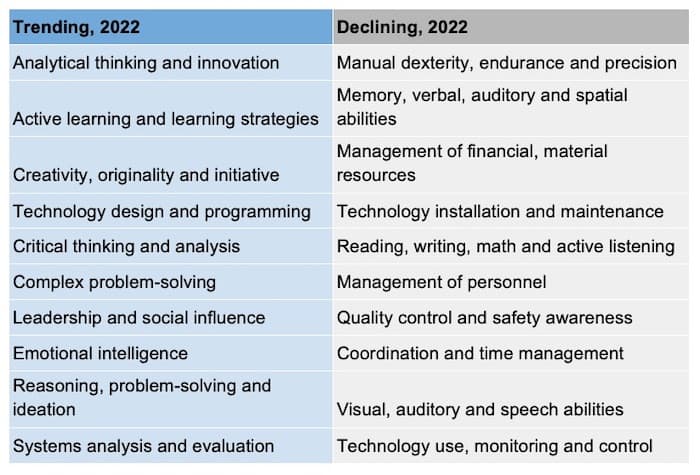An African Solution to the Digital Skills Gap: Preparing for the Future of Work in Emerging Markets
With the rise of artificial intelligence (AI), machine learning and cloud computing, the nature of work is transforming. The workplace is changing, raising fundamental questions about what it means to be a worker, and how to have a fulfilling career. While many focus on the possible downsides of these changes, like whether AI will displace millions of workers, we’d like to reframe the conversation and focus on the skills and workforce necessary for the (present and) future of work.
The needs of organizations and employers are changing. Technological changes have created new job positions and shifted responsibilities – increasing the demand for new skills. Workers who once required manual skills and physical abilities now need to be more analytical and strategic in their thinking.
A Mismatch in Supply and Demand
Let’s think about this in terms of supply and demand. As businesses invest in big data and AI, the demand for analyzing and creating value out of data has increased. In the past year alone, LinkedIn saw a 56% rise in data science job postings on their site, making data scientist the number 1 most promising job in the U.S. in 2019 (up from number 9 last year).
However, competent workers with the right skill set for data science and AI are in short supply. According to the August 2018 LinkedIn Workforce Report, the U.S. faces a shortage of almost 152,000 people with data science skills like mathematical competencies, data analysis and programming. Similarly, the 2019 Harvey Nash/KPMG CIO Survey of more than 3,600 global IT leaders revealed that technology leaders are struggling to find the right talent. The most-scarce skills are big data/analytics at 44%, followed by cybersecurity and AI at 39%.
This points to a larger demand for data science workers than there is supply of skilled workers. This mismatch is not just a problem for employers, but for all sectors that deal with data. LinkedIn estimates that the digital skills gap is already hindering digital transformation at 54% of companies. By 2030, they estimate that deficit may amount to a shortage of 4.3 million skilled workers globally – and the skills needed for these technical jobs are only increasing in complexity.
A Solution in Emerging Markets
But there is no shortage of potential data scientists, especially in emerging markets. According to the World Bank, Sub-Saharan Africa is the world’s youngest region, with more than 60% of its population under the age of 25. What’s more, 15 to 20 million increasingly well-educated young people are expected to join the African workforce every year for the next three decades. Over 89% of these youths will graduate high school and find themselves employed in the informal sector, devoid of benefits, job security and workplace regulations. At Digital Divide Data (DDD), we see this as an opportunity to upskill the workforce to reach its full potential.
Kenya, in particular, is ripe for upskilling, with the highest internet penetration rate in Africa at almost 90%. The World Economic Forum released an Index of Global Human Capital, assessing how well each country is developing its human capital by evaluating its capacity, deployment, development and know-how. In 2017, the most recent version of the report available, the index ranked Kenya 78th out of 130, up from 120 in 2016. The index attributes Kenya’s success to its large medium-skilled employment sectors and comparatively strong education quality and staff training. But there is still room for improvement, especially in education. Building and investing in the country’s human capital development is vital for GDP growth and stability – not to mention productivity, social development and inclusion.
DDD is working to upskill Kenyan youth as a path to employment and economic stability. This is part of our larger commitment to the UN Sustainable Development Goals, including SDG 4 (to ensure inclusive and quality education for all and promote lifelong learning); SDG 8 (to promote inclusive and sustainable economic growth, employment and decent work for all); and SDG 10 (to reduce inequality within and among countries).
Approaches to Upskilling Youth in Africa
In an effort to upskill these youth towards new higher-skilled roles and ensure that they achieve their full potential, we concentrate on both technical and soft skills. On the technical side, DDD has partnered with Amazon Web Services to launch the Kenya Cloud Academy of Excellence to train and certify youth in cloud computing competencies. We are also training youth in machine learning and data science skills, including data annotation and pattern recognition. With these skills, young people have a real competitive advantage in their local job markets.
On the analytical side, we are training youth in high-demand skills such as innovation, creativity and problem-solving (Table 1). As technology continues to evolve, repetitive and computational tasks will become automated, leaving more creative work for humans. Talent will need to be more flexible and dynamic, emphasizing the need for active learning, leadership and critical thinking skills. That’s why all DDD hires begin with “BEST Training,” in which they learn Business, English, Soft skills and digital Technology. We also encourage youth to build lifelong learning habits and professional development at DDD and beyond.
Table 1: 2020 Skills Outlook (World Economic Forum Jobs Report 2018)

The results speak for themselves. In our recent alumni survey, DDD alumni from Kenya reported an average salary of US $505 per month – far higher than the Kenyan minimum wage of US $135 per month. On average, DDD alumni earn almost five times more than their peers. This approach is being replicated in DDD’s offices in Cambodia and Laos, with promising results. These results are in line with the impact assessment of our programs worldwide, in which we estimate that DDD graduates will earn $175,000 more than their peers over their careers.
The future of work depends on being able to identify the gaps – in skills, technology and workforce – and finding ways to fill them with current and new resources. To address the skills gap, current workforces need to be upskilled in both technical and analytical skills. By leveraging untapped talent – especially from non-traditional sources such as emerging markets – we can better prepare for the future of work, whatever it may bring.
Becky Santora is the marketing manager at Digital Divide Data (DDD).
Photo courtesy of LinkedIn Sales Navigator.
- Categories
- Technology



